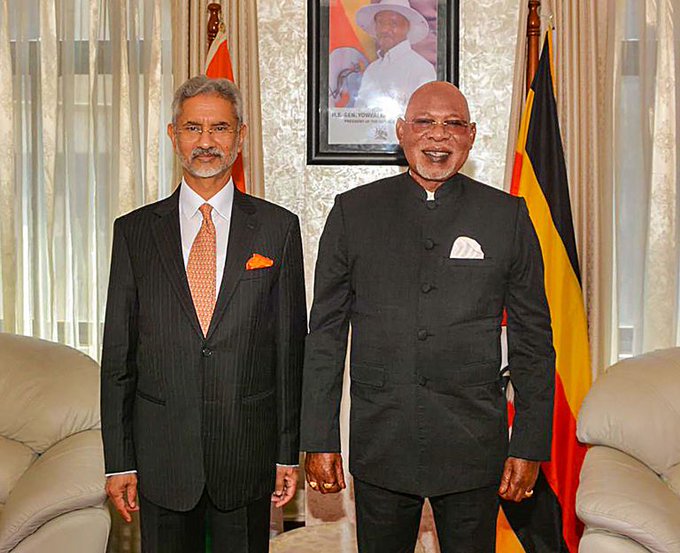The new initiative also calls for synergy between India’s development efforts and strategic outreach through Line of Credit in 42 African Union countries…reports Asian Lite News
India has introduced a holistic approach to push military exports to Africa, combining pitch for weapon sales with finance, training, infra development and soft-power.
The new initiative also calls for synergy between India’s development efforts and strategic outreach through Line of Credit (LoC) in 42 African Union countries. India would be assisting in building IT & technical training institutes, schools, health centres, roads, railways and ports, etc., paving the way for supplying Made-in-India armaments.
India has already messaged African Union members that its locally built armaments are far superior in quality and durability compared with Chinese armaments and much cheaper than Western defence systems.
To endorse India’s development and strategic outreach efforts External Affairs Minister Subramanyam Jaishankar visited Uganda and the Republic of Mozambique from 10-15 April. He also made a brief stopover in Addis Ababa, Ethiopia on April 13.
The visit witnessed the opening of the India-assisted National Forensic Sciences University (NFSU) in Jinja, Uganda, the first imitative of its kind in Africa. The EAM also reviewed development projects related to railways, roads and bridge infrastructure projects and a pharmaceutical manufacturing facility in Mozambique.
The high-mobility military vehicles were also gifted to the Uganda Peoples’ Defence Forces.
Peacekeeping has been a vital element of the India-Africa partnership since 1960. Over 6,000 Indians currently serve in peacekeeping operations in African countries. India’s decision to open 18 new diplomatic missions in Africa in the next few years, which will take the total number to 47, reflects its new Afro-centric approach.
To enhance defence exports and capacity-building efforts, India hosted top military commanders and service chiefs from 31 member countries of the African Union to participate in the first India-Africa Army Chiefs’ Conclave on 28 March in Pune. The Ministry of Defence said: “The Conclave focussed on joint training and defence cooperation amongst the nations to evolve an institutionalised framework to enhance collaboration in the fields of joint military training, execution of peacekeeping operations; besides promoting Indian defence industries.”
Additionally, the 2nd Africa-India Joint Exercise ‘AFINDEX’ was also held at Foreign Training Node, Aundh in Pune from 16 to 29 March 2023 with 124 participants from 25 African countries including Ethiopia, Egypt, Kenya, Morocco, Nigeria, Rwanda, and South Africa. On the sidelines of the exercise an ‘Equipment Display’ was organized in which 75 indigenous defence products from 32 domestic companies were showcased.
Currently, several African Union member countries regularly buy ‘Made in India’ armaments. The main buyers are Botswana, Burkina Faso, Egypt, Ethiopia, Mozambique, Mauritius, Namibia, Seychelles, Somalia, and South Africa. In some cases, India has even gifted armaments and military equipment to Mauritius and Seychelles.
Several defence public undertakings regularly export defence equipment to Algeria, Egypt, Ethiopia, Ghana, Honduras, Kenya, Libya, Malawi, Mauritius, Myanmar, Namibia, Nigeria, South Africa, Sudan, Surinam, Tanzania, Tunisia, Uganda and Zimbabwe.
The government has also nominated a few Defence Public Sector Undertakings (DPSUs) as export promotion agencies for selected African Union member countries to promote defence exports. “Subject to strategic considerations, domestically manufactured defence products will be promoted through Government-to-Government agreements and Lines of Credit/Funding,” MoD adds.
India is offering its key home-built weapons & platforms including Tejas fighters, light combat & utility helicopters, Akash missile batteries, artillery guns, Pinaka rockets launchers, besides, armoured vehicles, mobility vehicles, drones, loitering munitions, small arms, offshore patrol vessels, interceptor crafts, communication and surveillance equipment, etc for export to key African Union member allies.
India has set an armaments exports target of $5 billion by 2025 to achieve self-reliance in developing and building weapons & platforms. While India achieved $1.75 billion in defence exports in 2022 and is targeting $2.37 billion in 2023. The majority of armament exports will be executed by private defence companies.
One of the key MEA policy initiatives is to engage India Exim Bank to extend soft Lines of Credit (LoC) to Mauritius, Mozambique and Seychelles for the export of India-built weapons & platforms. The Exim Bank branches spread across Africa are exploring facilitating need-based LoC for the export of aerospace, defence, and maritime equipment with other African countries as well. India plans to export armaments and provide medical training to the armies of Botswana, Egypt, Kenya, Lesotho, Morocco, Namibia, Rwanda, Tanzania, Uganda and Zambia.
Interestingly, Nigeria will be the first country to buy unspecified numbers of indigenously built Light Combat Helicopters from state-run Hindustan Aeronautics Ltd through soft credit. Six officers from the Nigerian Army have already completed training on Chetak and Dhruv light helicopters at HAL’s Rotary Wing Academy in Bangalore.
Besides promoting defence exports, India is also focusing on capability building in agriculture and agro-processing, health and pharmaceuticals and disaster management and disaster management.
Indian private companies mainly work in Africa under the Indian LoC projects through the Exim Bank of India. However, very few private companies want to invest their own money in Africa and instead, they want to pursue projects through grants only. For Indian private companies, Africa has not fully emerged as a favourable destination.

